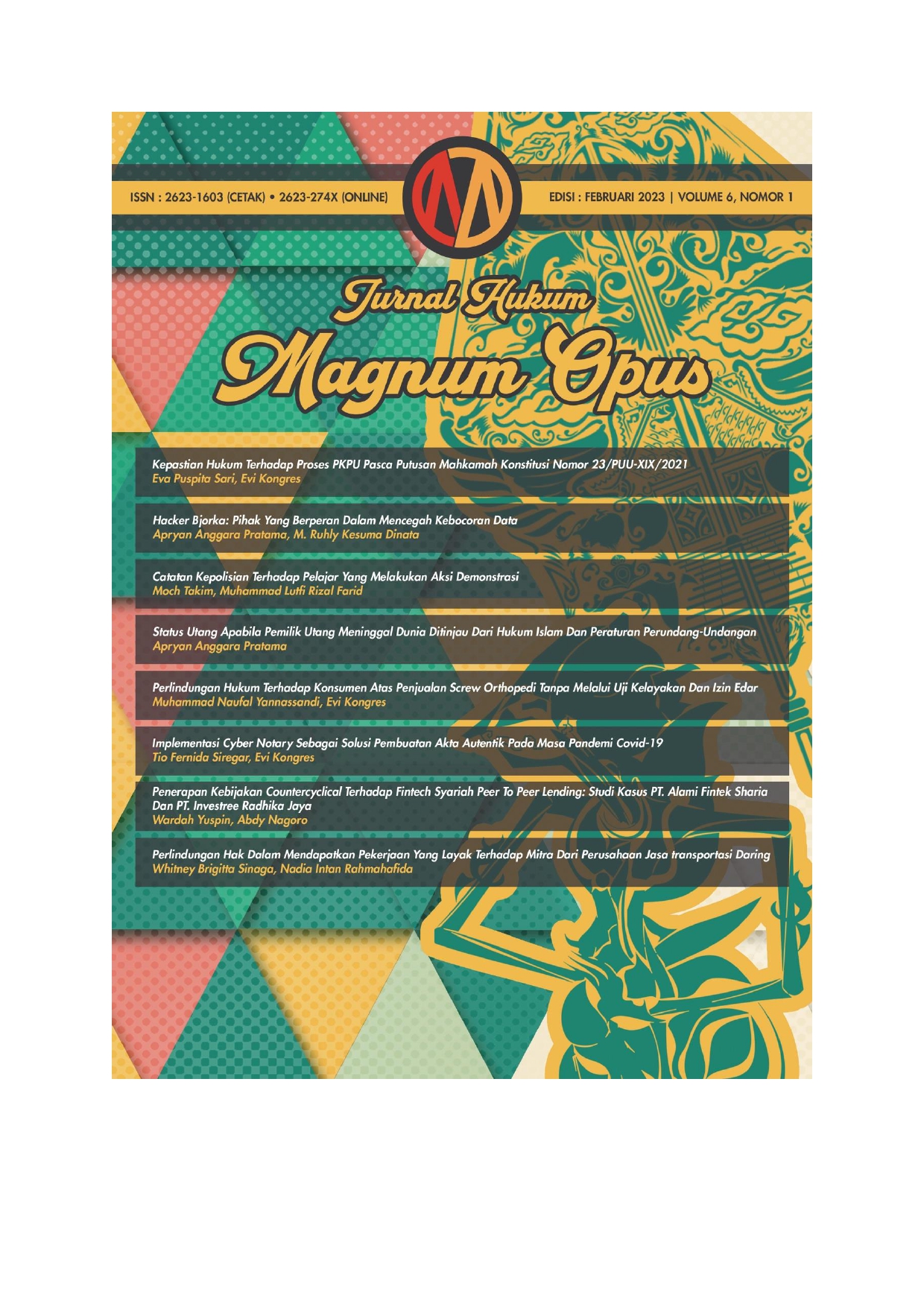Implementasi Cyber Notary Sebagai Solusi Pembuatan Akta Autentik Pada Masa Pandemi Covid-19
DOI:
https://doi.org/10.30996/jhmo.v6i1.7390Abstract
Cyber notary is a notary who carries out the authority of his position related to the duties and functions of a notary, especially in making deeds using information technology. This cyber notary concept is not an example of a form of disruption to the notary world that is still running conventionally, but rather an increase in its function and role in the digital era as it is today. This study isuses anormative juridical method with a statutory and conceptual approach. This research discusses the application of a cyber notary in makingauthentic deeds during the Covid-19 pandemic. The results show that the authentic deed made by implementing a cyber notary as a solution in the midst of the Covid-19 pandemic does not meet the requirements to be considered an authentic deed because the deed istnot made directly before a notary but uses a teleconference or video call, so the position of the deed degraded into a private deed therefore it does not have the same proving power as an authentic deed. On the other hand, the application of a cyber notary during the Covid-19 pandemic in terms of making a deed does not have to appear directly before a notary in order to be more efficient, save time and also costs.
Keywords: authentic deed; covid-19 pandemic; cyber notary
Abstrak
Cyber notary merupakan notaris yang menjalankan kewenangan jabatannya yang berkaitan dengan
tugas dan fungsi notaris, khususnya dalam pembuatan akta dengan menggunakan teknologi informasi. Konsep cyber notary ini bukan merupakan salah satu contoh bentuk disrupsi terhadap dunia kenotariatan yang masih berjalan secara konvensional, melainkan adanyapeningkatan terhadap fungsi serta perananya dalam era digital seperti saat ini. Penelitian ini menggunakan metode yuridis normatif dengan pendekatan perundang-undangan dan konseptual ini membahas mengenai penerapan cyber notary dalam pembuatan akta autentik pada masa pandemi Covid-19. Hasil penelitian menunjukkanjbahwa akta autentik yang dibuat dengan menerapkan cyber notary sebagai solusi di tengah-tengah pandemi Covid-19 belum memenuhi syarat untuk dapat dikatakan sebagai akta autentik karena pembuatan aktanya tidak secara langsung dihadapan notaris melainkan menggunakan teleconference atau video call, sehingga kedudukan akta tersebut terdegra- dasi menjadi akta di bawah tangan oleh karenanya tidak memiliki kekuatan pembuktian yang sama dengan akta autentik. Disisi lain, penerapan cyber notary pada masa pandemi Covid-19 dalam hal pembuatan akta tidak harus penghadap menghadap secara langsung di hadapan notaris agar dapat lebih efisien, menghemat waktu dan juga biaya.
Kata kunci: akta autentik; cyber notary; pandemi covid-19
Downloads
Downloads
Published
Issue
Section
License
Authors who publish with Jurnal Hukum Magnum Opus agree to the following terms:
- Authors transfer the copyright and grant the journal right of first publication with the work simultaneously licensed under a Creative Commons Attribution-ShareAlike 4.0 International License.. that allows others to share the work with an acknowledgement of the work's authorship and initial publication in this journal.
- Authors are able to enter into separate, additional contractual arrangements for the non-exclusive distribution of the journal's published version of the work (e.g., post it to an institutional repository or publish it in a book), with an acknowledgement of its initial publication in this journal.
- Authors are permitted and encouraged to post their work online (e.g., in institutional repositories or on their website) prior to and during the submission process, as it can lead to productive exchanges, as well as earlier and greater citation of published work (See The Effect of Open Access)













